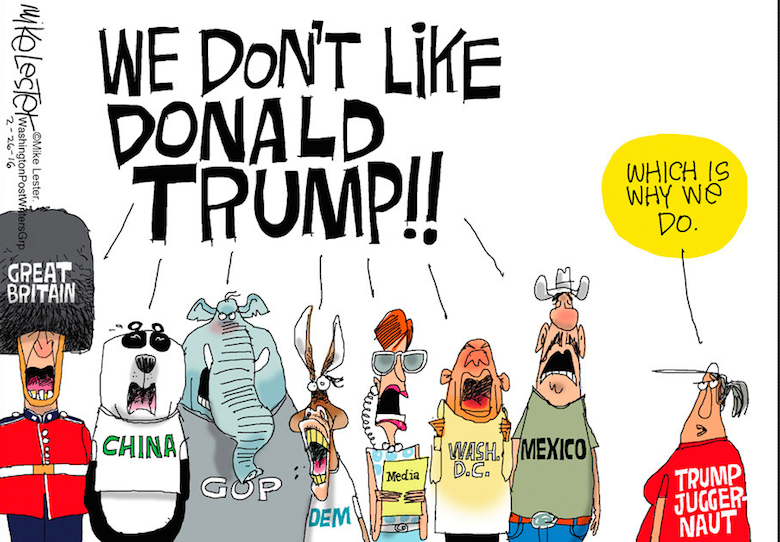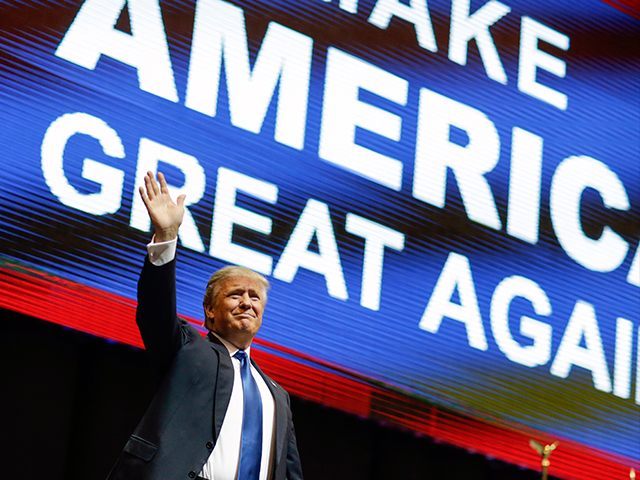
Trump’s Candidacy Reflects the US’ Current Plight at Home and Abroad
Trump’s abrupt rise fell below most people’s radars. He had just joined the Republican Party in 2012 and prior to this election had never held public office and had no political experience. Furthermore, he has been prone to committing gaffes during the election process, maliciously attacking other candidates and the media, raising inconceivable political stances and abundantly displaying his lack of political cultivation and experience. However, he has still been able to continue to win Republican primaries, defeating candidates with more political experience and prestige, defeating George W. Bush’s brother, among others, and finally overwhelming other candidates with his momentum to become the Republican nominee.
Trump’s candidacy reflects the United States' current predicament at home and abroad. During President Obama’s eight-year term, although the economy has recovered somewhat, this has not spread to the general public and working class. These people have been subjected to unemployment, suffered low wages and stressful lives, and have seen the gap between the rich and the poor grow. Thus, they have taken out their dissatisfaction on the liberalization of U.S. trade policy — especially when it comes to illegal immigration, which they perceive as stealing jobs and causing manufacturing and public security problems. They also blame foreign countries, including China, for dumping cheaply made goods into the U.S. market. Internationally, the United States' position is sliding in the face of the emergence of Russia and China. When it comes to the Middle East and the expansion of the Islamic State, not only have they beheaded American hostages, but they have produced terrorist attacks in the U.S. and anti-Muslim sentiment has also been aroused in a part of the U.S. populace. With regard to Americans receiving higher education and economically secure lives, they can still support Obama’s trade and security policies, but as far as middle and lower class citizens are concerned, free trade policies and illegal immigration are the exact source of their troubles.
Each of Trump’s extreme positions — building a large wall at the U.S.-Mexico border to stop Central and South American stowaways and narcotics; limiting imported products from China to protect American industry and labor; taking a hardline with other countries on trade negotiations to protect benefits for American trade; cracking down on the Islamic State group to defend U.S. security abroad; limiting Muslim immigration to the U.S. to protect domestic security – are simple, straightforward and easy to get. Although they deviate from traditional American values and policy, they are endorsed by the middle and lower classes of the United States. As a result, the Republican primary has received much support from grassroots and fundamentalist voters. As far as Trump’s foul mouth goes, that’s already become a trivial issue for voters, even to the point that it seems he is saying what he really thinks, and it's not enough to influence their determined support. Simply put, the rise of Trump represents the rise conservatism, nationalism and protectionism in the American populace as well as pushback against globalization, free trade, immigration, terrorism and the rise of developing nations.
Trump has already created an outstanding complication for the Republican Party. His unconventional style and political positions have not received the blessings of forces higher up in the Republican Party. They originally placed their hopes on nobody having the required 1,237 electoral votes at the Republican convention as the reasoning for consulting or trading votes to choose some other candidate to stand in for the election. However, with regard to every candidate having just withdrawn their candidacy, Trump can confidently obtain the nomination. If the Republican elites try to rub out Trump, this will lead to intense pushback from grassroots voters, leading to the collapse of the Republican Party. However, if compelled to nominate Trump there is also the possibility that this will lead to those in the party who do not endorse Trump’s positions defecting and voting for the Democrats, or not voting at all. Despite Trump being able to rely on extreme stances to defeat his competitors in the party, he may not be able to gain majority support in the general election and would thus cause the Republican Party to lose the election. When choosing the lesser of two evils, the approach of the Republican elites is changing. After all, Trump is the candidate the majority of Republican voters have endorsed, and he has a high profile domestically. If the Republican Party does not endorse him, thus leading to chaos in the party, this will undoubtedly cost them the election and hand power back to the Democrats for four more years. Nominating Trump at least gives them a fighting chance. Due to this, the Republican National Committee Chair Reince Priebus has already started calling Trump the presumptive nominee and has called on the whole party to completely unify and win the election.
Although the Democrats still have two candidates competing for the nomination, Hillary Clinton is way ahead of Sanders in delegate votes and should have no problem clinching the nomination, which will make it a showdown between her and Trump. Currently, the majority of U.S. opinion polls put Clinton ahead of Trump. However, riding a trend of anti-globalization and anti-establishmentarianism among the U.S. populace, Trump still holds a substantial base of support and excels in seizing on issues and promotion. Once the two are officially competing for office, Trump will set his sights on Clinton and maybe shape into a stifling force. Clinton herself has many negative points, including “emailgate” and excessively close ties with the financial sector on Wall Street. Whether those in the party who support Sanders will completely back Clinton is also questionable. Because of this, it is premature to infer who will be elected president at this moment. The real competition will begin once the respective candidates from each party are officially nominated. When that time comes, our country, along with the rest of the world, will closely watch how this election unfolds.


